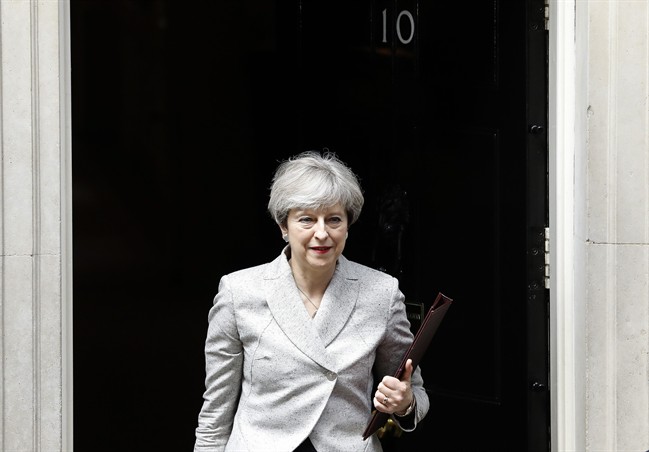I don’t mean to make light of what is clearly a serious situation, one in which lives are on the line and high-stakes diplomacy continues. But the entire affair currently unfolding between Russia and the United Kingdom is reminding me of a Robin Williams routine.

In a sketch comparing British police to their American counterparts, the late comedian observed, “In England, if you commit a crime, the police don’t have a gun and you don’t have a gun. If you commit a crime, the police will say ‘Stop! Or I’ll say ‘Stop! again.'”
The background context, for those not familiar, is fascinating stuff. In 2006, a colonel in the Russian military, Sergei Skripal, was arrested by Russia after the Russians determined he was a spy for the West — Great Britain, in particular. After four years, he was exchanged (among others) for Russian spies held in the West. He settled in Britain, and earlier this month, he and his adult daughter were suddenly felled by what British authorities have now concluded was attempted murder using an incredibly rare and extremely dangerous nerve agent, Novichok. Novichok was invented by the Soviet Union, and is only known to exist under Russian control.
The British have concluded — for fairly obvious reasons — that Skripal and his daughter were targeted by Russian agents, no doubt both to settle a score among angry former colleagues in Moscow, but also to send a message to any other would-be traitors to the Kremlin. The attack on Skripal is not the first such incident. Numerous enemies of the Russian state have come to sudden, violent ends — and some of these on British soil. The 2006 radioactive-tea slaying of Alexander Litvinenko, another former Soviet spy who fell out with the regime and fled to the West, is a prime example, but not the only one.
That’s the background. Skripal and his daughter remain in hospital in critical condition; a police officer who attempted to provide medical aid was also exposed to the nerve agent and hospitalized. The British are, as you can imagine, a bit cross about the whole thing. Earlier in the week, Prime Minister Theresa May demanded an explanation from Moscow by midnight on Tuesday. On Wednesday morning, with no satisfactory explanation having been presented, May announced a series of steps against the Russians, including a boycott of the 2018 World Cup (being hosted by Russia) by British government officials and members of the Royal Family, and the expulsion of 23 Russian diplomats from the U.K.

WATCH ABOVE: Britain expels 23 Russian diplomats over chemical attack on ex-spy

Get daily National news
Cue that Robin Williams joke. “Stop! Or I’ll say ‘Stop!’ again.”
Sadly, there are a lot more English cops with guns these days — a sign of the times. And despite recent cuts, Britain remains a formidable military power, and a nuclear power, as well. It can make its feelings known.
But Williams’ joke still has some truth to it. Boycotting a soccer tournament and booting some low-level diplomats (intelligence officers all, almost certainly) out of your country is pretty mild stuff compared to what the Russians apparently did. It’s bad enough that Moscow seems to feel that it can murder people with impunity on British soil. Using a nerve agent — which they obviously don’t know quite how to handle, given the collateral damage — is rather another thing.
It’s an outrage and requires a response. It’s time to come up with something that (to channel the fictional U.S. president Josiah Bartlett from The West Wing) doesn’t “feel like docking somebody’s damn allowance.”
So what would send a message to Russia? Turkey found out a few years ago that blowing one of their bombers out of the sky was an awfully good way to express displeasure, but as refreshing as it was to see Russian President Vladimir Putin put back on his heels for a moment, no reasonable observer would suggest that the British should go all tally-ho and scramble the Typhoons.
But the Brits need to do something, and they’re in an awkward spot. The willingness of the White House to directly engage Moscow is suspect (though the U.S. has certainly been hard on Russia during this Administration — it’s just not predictably so). Britain is, of course, a member of the EU … but it’s divorcing it. It’s a member of NATO, and can bring this matter to the North Atlantic Council’s attention, but it’s not like Putin is too worried about NATO being disappointed in him. Britain could go to the UN, but … but … I’m sorry, I couldn’t finish that sentence without laughing. Hooo! The UN! Yeah, sure, let’s do that.
All and all, it’s not a great spot to be in. The right answer might be a mix of targeted, brutal sanctions and economic measures against some of the billionaires close to Putin and some clandestine British intelligence work of their own. The spy game is an ugly one, and the British play it well. They’d know who to hurt, and how.
But in terms of what we see publicly, sadly, it’ll probably be sanctions plus more of the same. Princes William and Harry won’t be watching the footy in person this year, it seems. We’ll see how much Putin cares.












Comments